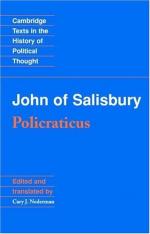|
This section contains 8,356 words (approx. 28 pages at 300 words per page) |

|
SOURCE: McGarry, Daniel D. “Educational Theory in the Metalogicon of John of Salisbury.” Speculum 23, no. 4 (October 1948): 659-73.
In the following essay, McGarry discusses John's philosophy of education and how it translates practically into curricula and teaching methods.
Periods of quickened intellectual activity in occidental history have stimulated the pulse of speculation concerning education. The ‘Golden Age’ of the Greeks gave birth to the educational philosophies of Plato and Aristotle; that of their intellectual tyros, the Romans, to the pedagogical theories of Cicero and Quintilian; while the Renaissance produced Vittorino and Erasmus. The twelfth century was no exception. A contemporary, John of Salisbury, could remark, not without a touch of irony, that ‘everyone is priding himself on being a logician,’1 and ‘all are lecturing on and discussing the arts.’2 Notable among treatises on education in that day were the Didascalion3 of Hugh of St Victor the Eptateuchon4 of Thierry...
|
This section contains 8,356 words (approx. 28 pages at 300 words per page) |

|


